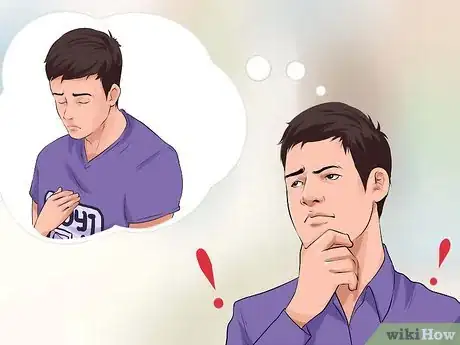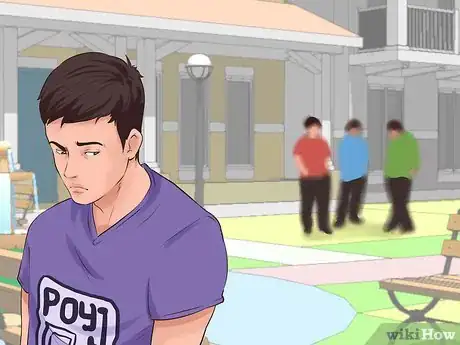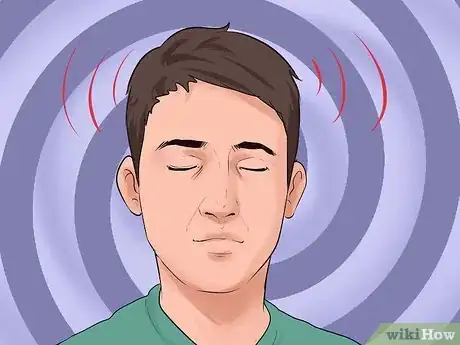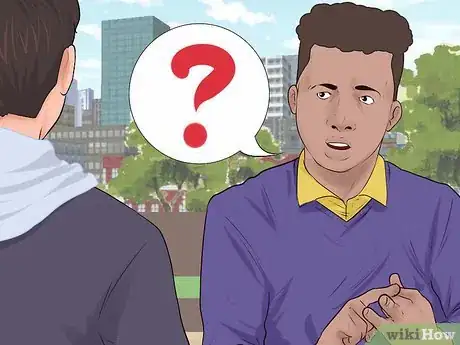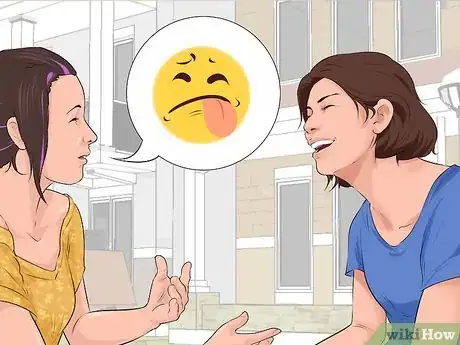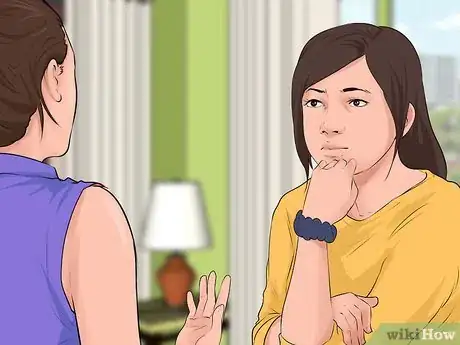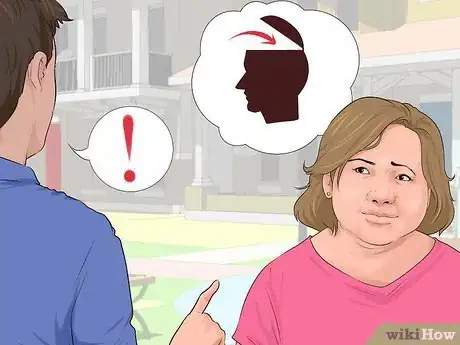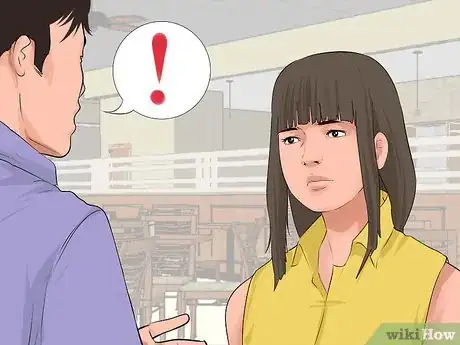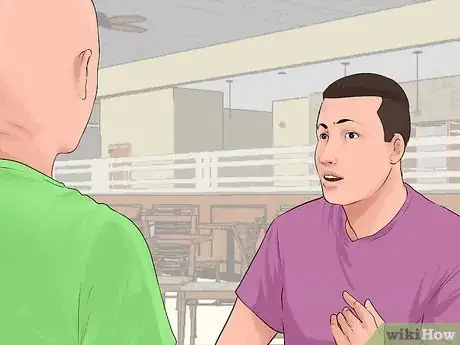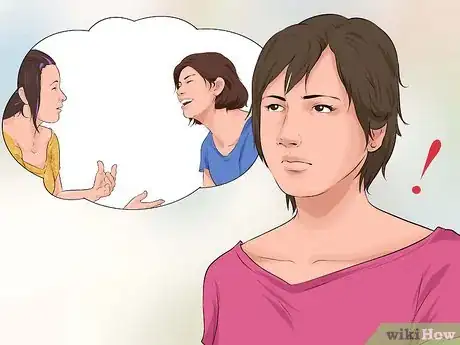This article was co-authored by Sarah Schewitz, PsyD. Sarah Schewitz, Psy.D. is a licensed clinical psychologist by the California Board of Psychology with over 10 years of experience. She received her Psy.D. from the Florida Institute of Technology in 2011. She is the founder of Couples Learn, an online psychology practice helping couples and individuals improve and change their patterns in love and relationships.
There are 13 references cited in this article, which can be found at the bottom of the page.
wikiHow marks an article as reader-approved once it receives enough positive feedback. In this case, several readers have written to tell us that this article was helpful to them, earning it our reader-approved status.
This article has been viewed 275,559 times.
Being disliked by people can be a painful experience, but it's also a part of life that everyone has to figure out how to deal with. Learning how to defend yourself from being harmed by these people, how to correct misunderstandings, and how to keep things from getting out of control will give you a leg up in life. The experience doesn't have to turn sour if you know how to handle yourself in these unpleasant situations.
Steps
Self-Care Strategies
-
1Decide if you should care. Not everyone who crosses your path is someone you should seek out as a friend. If a coworker or someone you aren't invested in dislikes you, it may not be pleasant, but you can decide if it's worth it to try to build the necessary bridges and win them over. Not everyone is worth your effort, especially if they are really difficult and you lose nothing by avoiding them.[1]
-
2Take a look at yourself. Did you make a mistake? Does the person have a legitimate reason to dislike you? It might be worth it to apologize and try to set the record straight about your behaviors if you think they might be justified in not liking something you did or are doing.[2]
- Admitting a mistake is different from beating yourself up about it. Everyone makes mistakes. It's important to forgive yourself, even if the other person doesn't.
Advertisement -
3Disengage. Don't be afraid to say goodbye if the person is actively trying to hurt you. It's okay to prioritize yourself in these situations and remove yourself from the crosshair. Sometimes people rub each other the wrong way and there's nothing to be done but avoid each other, especially if the situation is getting out of control and you are getting hurt.[3] [4]
- It can be tempting sometimes to stay and fight, but disengaging is its own form of power. You are standing up for yourself and telling the person that you refuse to be bullied.
- Disengaging might be avoiding them when it's acceptable to do so, like if you're coworkers but you aren't collaborating on anything. It might also be removing the person from your social media feeds so that you aren't tempted to interact with them.
-
4Let go of the need for approval. How important is it that this person likes you? Are there other people who do like you? Friends and family? Avoid worrying about one person who has a problem with you, which could be about their own issues rather than anything to do with you.[5]
- Some people will dislike you because they envy you. Don't let people bring you down because of your successes.
-
5Focus on the positive things. If you're feeling down about someone disliking you, do something to help yourself feel better. If you love working out, go to the gym to get your mind off of things. If you have friends who appreciate you, spend time with them to remind yourself of your self-worth. This doesn't have to bother you if you don't let it.[6]
- If you know why the person dislikes you, ask yourself if it's really important that they like you. Does it really matter what they think? Do they dislike a lot of people? You may not be "special" in that case.
- You can also try reframing the criticism to make it positive. If someone says you're always late or always asking people for favors, try to think of ways you could improve in those areas. Alternatively, if you think the person is wrong, try to think of all the times you're not late and the times you do favors for other people.
Repairing the Relationship
-
1Ask questions. If the relationship is one you want or need to improve, start by asking the person why he or she doesn't like you. There could be a huge misunderstanding behind everything, and you could receive valuable information about how the person perceives you (which isn't necessarily how you actually are).
- Try asking in a way that isn't confrontational. Instead of saying "what's your problem?" you can say "did I do something to make you dislike me?"
-
2Avoid getting defensive. It's natural to want to fight fire with fire, but if someone is expressing frustration with something you are doing, it can be helpful to take a pause and do your best to respond to the situation calmly, rather than making things worse by charging into battle.[7]
- Avoid snapping at them or returning the criticism. You can probably think of things that you dislike about them as well, but being mean to them won't resolve the situation. Criticizing the person will only cause the conflict to get more intense.
- Practice deep breathing while they are talking to keep yourself from getting upset and firing back.
- It's okay to take a temporary time out and come back to the person once you have cooled off, as well.
-
3Hear the person out. If you talk to them, let them finish their thoughts before you jump in. You may not like what they are saying, but if you want to repair the relationship, you will need to know what you are dealing with, and you will gain their respect if you respect them enough to listen before you respond. You may even gain some valuable constructive criticism in the process.[8]
- You can say "I understand that there's something about me you don't like. I'm genuinely interested to hear what that is and see if we can move past this issue together."
-
4Take a break. Sometimes people get on each other's nerves because they are spending too much time around each other, for example coworkers or friends of friends. If you work with the person, do your best to limit contact for a while. If you spend a lot of the time around the same people, try to see other friends or catch these friends while the other person isn't around. Time apart can help people reset, and they may like you more when they see you again.[9]
-
5Communicate your feelings. A good way to correct misunderstandings is to let the other person know how you feel. Try to do this in a respectful and emotionally neutral way. Clearing the air may be just what the situation needs to get the person on your side, rather than stewing in their dislike of you.[10]
- Using "I statements" is a good way to communicate without making the person feel like they are being attacked. You can say "I feel hurt that you don't like me and I'd like to know what I can do to make things better between us."
Performing Damage Control
-
1Explain yourself to people that matter. If someone dislikes you, they may gossip about you to mutual friends or try to hurt you in other ways. If it's a coworker, sit down with your boss and explain that you are having a disagreement with the person, so your boss will be on the lookout for attempts to sabotage your standing at the job. If it's a mutual friend, explain your position and try to get them to see your side of things. Avoid bad-mouthing the person![11]
-
2Avoid giving the person ammunition. If someone dislikes you, they may try to find out your secrets in order to hurt you. Be careful what you say to someone who dislikes you. Avoid gossiping about other people around them, because they might use that information against you. Protect yourself by keeping your cards close to your chest and not allowing them to use anything you say to hurt you. If it's a coworker, try to avoid messing up on the job around them, which may come back to bite you.[12]
- If the person who dislikes you is a former friend, they may already know a lot that could hurt you. If you think they are going to share something that could make you look bad, you can always share the information first, if you would rather have control of how it comes out.
-
3Prevent the situation from spiraling out of control. Sometimes it's worth it to apologize to someone who dislikes you, especially if you've done something to offend them. Even if you think you didn't do anything wrong, it may be helpful to apologize in order to keep the situation from getting worse. You can do it for you, rather than for them, although you never know how it might affect their opinion of you in a positive way.[13]
-
4Check in with friends. If the person is causing you to doubt yourself, ask your friends what they think about the situation if they know the person. Getting a second opinion, especially from people you trust, can help to prevent you from taking the perspective of the other person and being really hard on yourself. Being disliked can make you wonder if they are right about you, so it's important to be aware of how it's affecting you. Don't let your mental health suffer from it.[14]
-
5Try to win the person over. Sometimes all it takes to repair a friendship or working relationship is to show the person your good will. Going out of your way to do something for people has a lot of benefits. Kindness reduces stress and promotes longer, healthier living.[15] Additionally, if you are kind to the person in spite of their dislike toward you, it may inspire them to change their mind about you.
- Watch out for people who will manipulate your kindness, however. Some people feed off of using people who are not willing to protect themselves against aggressive or manipulative behavior. If they accept your kindness and then return it with selfishness or rudeness, it may be best to avoid them rather than try to win them over.[16]
Expert Q&A
-
QuestionWhat does it mean if someone doesn't like you for no reason?
 Sarah Schewitz, PsyDSarah Schewitz, Psy.D. is a licensed clinical psychologist by the California Board of Psychology with over 10 years of experience. She received her Psy.D. from the Florida Institute of Technology in 2011. She is the founder of Couples Learn, an online psychology practice helping couples and individuals improve and change their patterns in love and relationships.
Sarah Schewitz, PsyDSarah Schewitz, Psy.D. is a licensed clinical psychologist by the California Board of Psychology with over 10 years of experience. She received her Psy.D. from the Florida Institute of Technology in 2011. She is the founder of Couples Learn, an online psychology practice helping couples and individuals improve and change their patterns in love and relationships.
Licensed Psychologist Try not to take it too personally; your worth is not determined by whether or not somebody likes you. Also, try to keep it as minimal as possible when you interact with them.
Try not to take it too personally; your worth is not determined by whether or not somebody likes you. Also, try to keep it as minimal as possible when you interact with them.
Warnings
- Do not instigate any physical conflict.⧼thumbs_response⧽
- Avoid a bitter, drawn-out emotional conflict with the person.⧼thumbs_response⧽
References
- ↑ https://www.psychologytoday.com/blog/wander-woman/201209/what-do-when-someone-doesn-t-you
- ↑ https://www.psychologytoday.com/blog/all-the-rage/201506/5-ways-deal-angry-people
- ↑ Sarah Schewitz, PsyD. Licensed Psychologist. Expert Interview. 11 March 2021.
- ↑ https://www.psychologytoday.com/blog/all-the-rage/201506/5-ways-deal-angry-people
- ↑ https://www.psychologytoday.com/blog/counseling-keys/201411/8-ways-talk-difficult-people
- ↑ https://www.psychologytoday.com/blog/making-change/201006/generating-self-esteem-positive-thinking-and-other-improvements
- ↑ https://www.psychologytoday.com/blog/wander-woman/201209/what-do-when-someone-doesn-t-you
- ↑ https://askthecognitivebehaviortherapist.com/2014/01/26/psychologist-nyc/
- ↑ https://www.psychologytoday.com/blog/the-friendship-doctor/200910/5-tips-unloading-needy-friend
- ↑ https://www.psychologytoday.com/blog/counseling-keys/201411/8-ways-talk-difficult-people
- ↑ https://gbr.pepperdine.edu/2010/08/are-workplace-bullies-sabotaging-your-ability-to-compete/
- ↑ https://www.psychologytoday.com/blog/lifetime-connections/201410/how-cope-gossip-work
- ↑ https://www.psychologytoday.com/blog/promoting-empathy-your-teen/200911/why-apologies-are-important?collection=138249
- ↑ http://www.webmd.com/mental-health/features/coping-with-psychological-warfare-home
- ↑ http://www.webmd.com/balance/features/science-good-deeds
- ↑ http://www.the-scientist.com/?articles.view/articleNo/31652/title/Killing-with-Kindness/
About This Article
Being disliked can be painful, but you can deal with people who don’t like you by taking steps to repair the relationship. The best way to improve your relationship is to ask the person why they don’t like you. While it could be that there is a huge misunderstanding, you might also realize that you offended or hurt them too. Try asking in a non-confrontational way, like “Did I do something to make you dislike me?” As they explain their feelings, avoid getting defensive and let them finish their thoughts without jumping in. Once you know their point of view better, try to find a solution, which might mean taking a break from each other or winning them over through acts of kindness. For more tips from our co-author, like how to disengage from hurtful people, read on.

